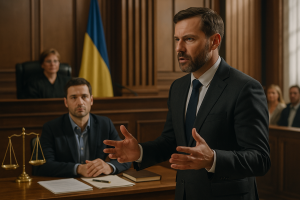In today’s information society, criminal proceedings are increasingly accompanied by significant public resonance. Already at the stage of searches or serving a notice of suspicion, a person may find themselves at the center of public attention, which forms its own ‘verdict’ long before the court’s decision.
 Sources of such pressure are diverse: journalistic investigations, activist campaigns, political statements, publications on social media, or anonymous messages in Telegram channels. As a result, the judicial process turns into a kind of public theater, where every move of the parties is analyzed and evaluated by a wide audience. This inevitably affects the atmosphere of the case consideration and indirectly – the impartiality of the court.
Sources of such pressure are diverse: journalistic investigations, activist campaigns, political statements, publications on social media, or anonymous messages in Telegram channels. As a result, the judicial process turns into a kind of public theater, where every move of the parties is analyzed and evaluated by a wide audience. This inevitably affects the atmosphere of the case consideration and indirectly – the impartiality of the court.
Presumption of Innocence at Risk
One of the most alarming trends is the violation of the presumption of innocence. A person is often deemed guilty in the public space even before the court receives and examines the evidence. This not only violates constitutional guarantees but also distances Ukraine from the standards of a democratic rule of law.
Courts have already reacted to such cases. For example, the High Anti-Corruption Court in its rulings of 31.10.2023 in case No. 991/392/23 and of 17.01.2024 in case No. 991/4071/22 recognized the facts of the presumption of innocence violation by the pre-trial investigation authorities, referring to the Constitution of Ukraine, the Criminal Procedure Code, and the Convention for the Protection of Human Rights.
The Role of the Lawyer
In the conditions of public pressure, the lawyer becomes not only a legal defender but also a key figure ensuring the client’s right to a fair trial. They have to act in two realities: the legal one, where laws and procedures are decisive, and the media one, where emotions, assumptions, and manipulations prevail.
The lawyer can and should respond to public violations of the client’s rights:
-
by filing complaints about the violation of the presumption of innocence;
-
by appealing to the court with lawsuits to protect honor, dignity, and business reputation;
-
if necessary – by appealing violations to the European Court of Human Rights.
New Challenges
Particular danger is posed by anonymous Telegram channels, which are often used for targeted attacks on specific individuals. Information pressure increases during the stages of choosing a preventive measure, its extension, or during the appellate review.
In such conditions, the lawyer becomes not only a representative in court but also a kind of stabilizer for the client, who often faces enormous psychological and social pressure.
Conclusion
High-profile criminal proceedings are not only a test of legal mechanisms but also a challenge for society and the state. The lawyer in such cases fulfills a mission to protect the fundamental values of the rule of law – the independence of the judiciary, the presumption of innocence, and the right to a fair trial.
Therefore, the effectiveness of the defender’s work in high-profile cases goes far beyond legal practice and becomes a guarantee of trust in justice.



